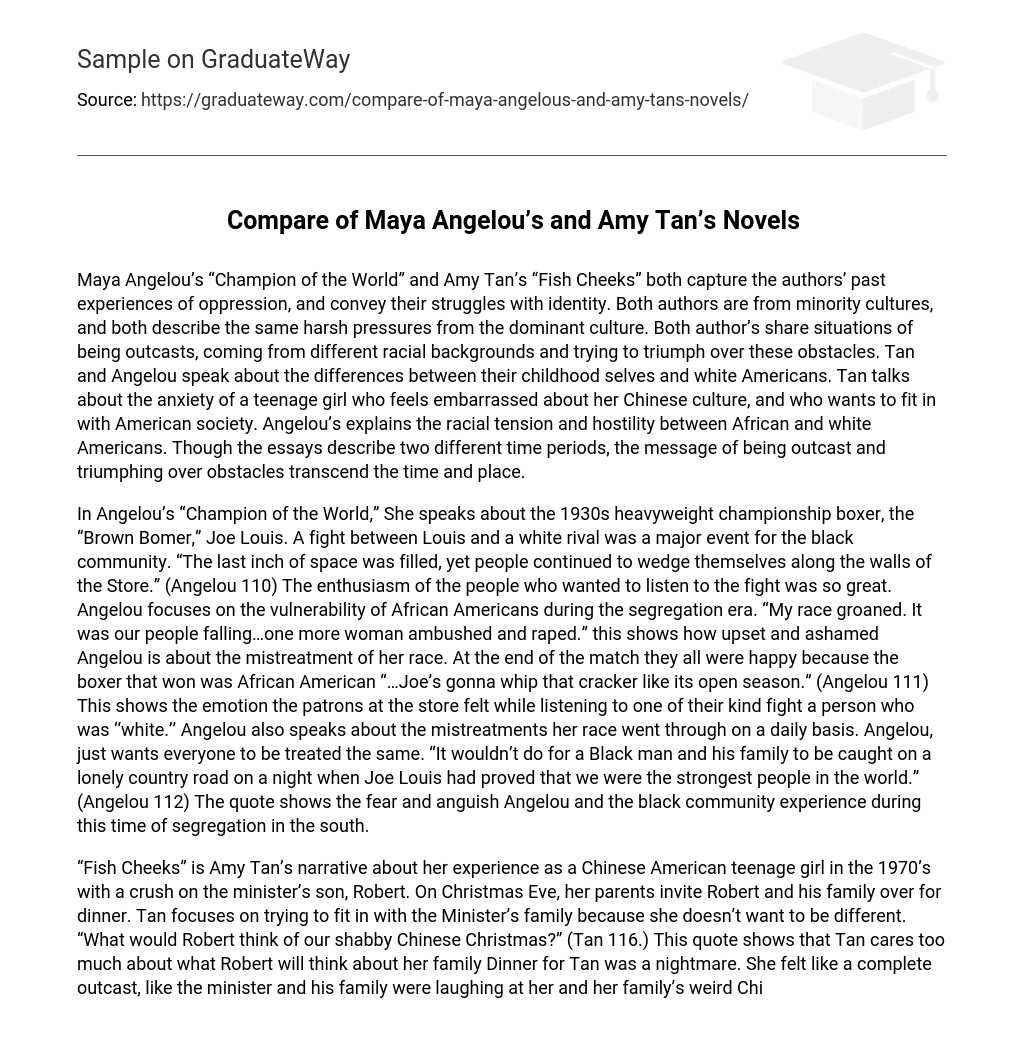Maya Angelou’s “Champion of the World” and Amy Tan’s “Fish Cheeks” both capture the authors’ past experiences of oppression, and convey their struggles with identity. Both authors are from minority cultures, and both describe the same harsh pressures from the dominant culture. Both author’s share situations of being outcasts, coming from different racial backgrounds and trying to triumph over these obstacles. Tan and Angelou speak about the differences between their childhood selves and white Americans. Tan talks about the anxiety of a teenage girl who feels embarrassed about her Chinese culture, and who wants to fit in with American society. Angelou’s explains the racial tension and hostility between African and white Americans. Though the essays describe two different time periods, the message of being outcast and triumphing over obstacles transcend the time and place.
In Angelou’s “Champion of the World,” She speaks about the 1930s heavyweight championship boxer, the “Brown Bomer,” Joe Louis. A fight between Louis and a white rival was a major event for the black community. “The last inch of space was filled, yet people continued to wedge themselves along the walls of the Store.” (Angelou 110) The enthusiasm of the people who wanted to listen to the fight was so great. Angelou focuses on the vulnerability of African Americans during the segregation era. “My race groaned. It was our people falling…one more woman ambushed and raped.” this shows how upset and ashamed Angelou is about the mistreatment of her race. At the end of the match they all were happy because the boxer that won was African American “…Joe’s gonna whip that cracker like its open season.” (Angelou 111) This shows the emotion the patrons at the store felt while listening to one of their kind fight a person who was ‘‘white.’’ Angelou also speaks about the mistreatments her race went through on a daily basis. Angelou, just wants everyone to be treated the same. “It wouldn’t do for a Black man and his family to be caught on a lonely country road on a night when Joe Louis had proved that we were the strongest people in the world.” (Angelou 112) The quote shows the fear and anguish Angelou and the black community experience during this time of segregation in the south.
“Fish Cheeks” is Amy Tan’s narrative about her experience as a Chinese American teenage girl in the 1970’s with a crush on the minister’s son, Robert. On Christmas Eve, her parents invite Robert and his family over for dinner. Tan focuses on trying to fit in with the Minister’s family because she doesn’t want to be different. “What would Robert think of our shabby Chinese Christmas?” (Tan 116.) This quote shows that Tan cares too much about what Robert will think about her family Dinner for Tan was a nightmare. She felt like a complete outcast, like the minister and his family were laughing at her and her family’s weird Chinese cuisine. She felt embarrassed at dinner saying, “I wanted to disappear.” (Tan 117) Tan was also paying close attention to the expressions on Robert’s face. “Robert was looking down at his plate with a reddened face.” As she focused, she realized that for dinner, her mom had cooked all her favorite Chinese foods. She sees that her customs and culture are different than that of an American.
Even though these two authors are different, they share the same significant transformation. Through Louis winning the fight, the African American community was finally able to feel superior. Tan was able to overcome her shame upon her Chinese family as she grew up. Broth characters faced different scenarios but learned the same lesson of self-acceptance; Tan and Angelou both took pride in their ethnicity finally realizing that their race is important not only to them but society.





